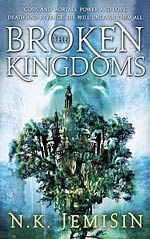
![]() Nymeria
Nymeria
5/23/2015
![]()
One of the surprises awaiting me in this book was the jump in time and characters from book one, The Hundred Thousand Kingdoms: it's been ten years since the upheaval brought on by Yeine, and the world has more or less settled into its new tracks, even though unrest still simmers under the surface. And the focus of the story is on a new character, Oree, a blind artist who can nonetheless acquire a sight of sort because she can perceive magic.
Oree, by her own definition, is "plagued by gods": she has been the lover of Madding, one of the godlings peopling the city and moving among mortals, and she has taken into her home an odd one she calls Shiny because of his ability to glow at sunrise. Shiny is a strange, dark and brooding creature, who seeks death in many ways - only to be resurrected from it every time - and who never speaks. A mystery, a puzzle to be solved: and Oree's innate curiosity is such that she can't pass up this kind of challenge. When the murdered and desecrated body of a godling is found in an alley, an event that should have been next to impossible and is only the first in a long chain of killings, Oree finds herself enmeshed in a spiral of conspiracies and wars between the two worlds - that mortals' and the gods' - and discovers something unexpected and terrible about her origins.
The tale is told from Oree's viewpoint (much as it was done with Yeine in the first book, and with a surprise right at the end (even though it's a different kind of surprise): Oree's voice is quite peculiar, witty and self-deprecating at times, but always bringing her inner strength to the fore, even when she finds herself at the center of events well over her head. There's a core of toughness in Oree that does not come only from dealing with her disability - and dealing very well with it, at that - but also from a soundness of spirit that reveals itself in the most unlikely moments. Despite that, she comes across as less empowered than Yeine was, or maybe it all depends on the background of the story, more focused on the life of mortals and common citizens and less interested in the political intrigue and back-stabbing plots that stood at the basis of The Hundred Thousand Kingdoms.
This factor brought me to enjoy The Broken Kingdoms a little less than it should have: I loved the book, no question about that, yet I had this nagging sensation that something was missing. Much as Yeine did in the previous story, Oree must unravel a mystery and at the same time worry about her own survival, and she does that mostly thanks to people who care about her: you can see how she touches their lives in a way that compels them to act in this fashion. The relationship - never truly ended - with the godling Madding is a good example of that, and their interactions poignant and believable. The difficult rapport with Shiny, and its evolution once his real identity is brought to the fore, feels equally real and makes for quite interesting developments. Yet the sense of urgency, of clear and present danger that seemed to hound Yeine at every twist and turn of the story, here is somewhat diluted: the reason for the conspiracy that's causing so many godlings' deaths appeared too convoluted and the villains at the root of it all sometimes sported a mustache-twirling attitude that I found a little out of place in this kind of story and in a writing level such as Jemisin's.
I believe my main contention with this story was the abundance of magic: the magic spill-off of so many godlings walking the city's streets is what allows Oree to see, after a fashion, and that is an interesting twist that allows her to be both helpless and autonomous at the same time. But there was, in my opinion, too much magic going around, too many possibilities for deus-ex-machina interventions that somewhat robbed this story of its potential for drama.
Granted, the magic in this world represents power, and it's woven inexorably into its tapestry, and yet it was more subtly represented in the first book of this trilogy, becoming just one of the players instead of being one of the main characters.
Despite this minor disturbances, I fully enjoyed this tale about power and love, betrayal and forgiveness, greed and heroism: Jemisin has a way of enmeshing her readers into the world she crafts and keeping them there, and this one delivers on its promises. It will be quite interesting to see how the trilogy will end in the third and final book.
http://spaceandsorcery.wordpress.com